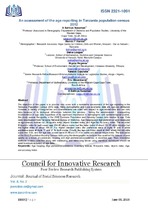| dc.contributor.author | Mwambene, Eric | |
| dc.contributor.author | Appunni, Sathiya Susuman | |
| dc.contributor.author | Hamisi, Hamisi F. | |
| dc.contributor.author | Lougue, Siaka | |
| dc.contributor.author | Regassa, Nigatu | |
| dc.contributor.author | Ogujiuba, Kanayo | |
| dc.date.accessioned | 2015-09-17T13:19:45Z | |
| dc.date.available | 2015-09-17T13:19:45Z | |
| dc.date.issued | 2012 | |
| dc.identifier.citation | Susuman, A.S. et al. (2015). An assessment of the age reporting in Tanzania population census. Indian journal of social research. 8(2):1553-1563 | en_US |
| dc.identifier.issn | 0019-5626 | |
| dc.identifier.uri | http://hdl.handle.net/10566/1629 | |
| dc.description.abstract | The objective of this paper is to provide data users with a worldwide assessment of the age reporting in the Tanzania Population Census 2012 data. Many demographic and socio-economic data are age-sex attributed. However, a variety of irregularities and misstatements are noted with respect to age-related data and sex ratio data because of its biological differences between the genders. Noting the misstatement / misreporting, inconsistence of age data regardless of its significant importance in demographic and epidemiological studies, this study assess the quality of the 2012 Tanzania Population and Housing Census data relative to age. Data were downloaded from Tanzania National Bureau of Statistics. Age heaping and digit preference were measured using summary indices viz., Whipple‟s index, Myers‟ blended index, and Age-Sex Accuracy index. The recorded Whipple‟s index for both sexes was 154.43, where males had the lower index of about 152.65 while females had the higher index of about 156.07. For Myers‟ blended index, the prefrences were at digits „0‟ and „5‟ while avoidance were at digits „1‟ and „3‟ for both sexes. Finally, the age-sex index stood at 59.8 where the sex ratio score was 5.82, and the age ratio scores were 20.89 and 21.4 for males and female respectively. The evaluation of the 2012 Population Housing Censes data using the demographic techniques has qualified the data as of poor quality as a result of systematic heaping and digit preferences/avoidances in recorded age. Thus, innovative methods in data collection along with measuring and minimizing errors using statistical techniques should be used to ensure accuracy of age data. | en_US |
| dc.language.iso | en | en_US |
| dc.publisher | Academic Research Publishing | en_US |
| dc.rights | "Intellectual properties and scientific inventions published with JSSR are protected under International and Federal
Copyright Laws and Treaties. Permission to make digital or hard copies of part or all of this work for personal or
classroom use is granted without fee provided that copies are not made or distributed for profit or commercial
advantage and that copies bear this notice and the full citation on the first page. Copyrights for components of this work
owned by others than JSSR must be honored. Abstracting with credit is permitted. To copy otherwise, to republish, to
post on servers or to redistribute to lists, requires prior specific permission and/or a fee." | |
| dc.rights | This work is licensed under a Creative Commons Attribution 3.0 License. | |
| dc.subject | Population census | en_US |
| dc.subject | Tanzania | en_US |
| dc.subject | Socio-economic data | en_US |
| dc.subject | Demographic data | en_US |
| dc.subject | Household census data | en_US |
| dc.subject | Housing census data | en_US |
| dc.title | An assessment of the age reporting in Tanzania population census | en_US |
| dc.type | Article | en_US |
| dc.privacy.showsubmitter | false | |
| dc.status.ispeerreviewed | true | |

